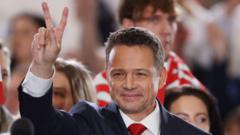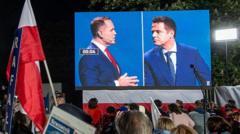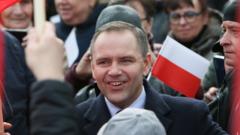An exit poll indicates that Warsaw Mayor Rafal Trzaskowski claims a narrow lead over conservative candidate Karol Nawrocki in Poland's presidential election. Both candidates prepare for a decisive run-off, revealing stark political divides and anticipated challenges ahead.
Polarizing Presidential Race in Poland: Trzaskowski and Nawrocki Prepare for Run-Off

Polarizing Presidential Race in Poland: Trzaskowski and Nawrocki Prepare for Run-Off
Warsaw's liberal mayor leads a closely contested presidential election, setting the stage for a critical second round against his conservative opponent.
Warsaw Mayor Rafal Trzaskowski emerged with a slight edge in Poland's presidential election, according to an exit poll released post-voting, but a second-round showdown against conservative historian Karol Nawrocki is now inevitable. Trzaskowski, associated with the centrist Civic Platform (PO) party led by Prime Minister Donald Tusk, garnered approximately 30.8% of the votes, while Nawrocki followed closely behind with 29.1%. With no candidate achieving the required majority, a run-off is slated for June 1.
Trzaskowski, addressing supporters at a rally in Sandomierz, expressed optimism about the forthcoming elections but acknowledged the uphill battle ahead, stating, "We're going to win," while emphasizing the need for determination throughout the campaign. He conveyed intentions to partner with Tusk's coalition, aiming to reform Poland's strict abortion laws and address the judiciary’s politicization under the previous Law and Justice (PiS) government.
Despite his lead, Trzaskowski's performance fell short of pre-election predictions, raising concerns as the final results are eagerly awaited. The Polish presidency, while largely a ceremonial role, holds the vital power to veto government initiatives. Tusk’s coalition is currently hampered by a lack of a parliamentary majority to effectively counter presidential vetoes, highlighting the weight of the upcoming election.
For Nawrocki, dissenting against Tusk’s potential ascendancy remains a priority, as he urged supporters of far-right candidates Slawomir Mentzen and Grzegorz Braun to unite against the centrist coalition to "save Poland." Mentzen achieved a significant third place with 15.4%, which may complicate Trzaskowski's coalition-building efforts, as many far-right supporters may not align with either candidate in the run-off.
The future political landscape will largely depend on voter mobilization with notable independents and supporters from minority parties, who might be pivotal in such a tightly contested race. Many far-right voters who resonate with Catholic and traditional family values might find alignment with Nawrocki, while remaining skeptical of his party's economic policies, placing emphasis on the potential fragmentation of votes as the election nears.
Moreover, Braun's far-right messaging—and his controversial actions, including the disparagement of Jewish traditions—might alienate liberal constituents, raising tensions within the political discourse as candidates vie for unity among what seems to be increasingly polarized voter bases. As the Polish electorate gears up for what could be a defining moment in its political trajectory, the question remains: which candidate can effectively rally support in the face of stark ideological differences?
















